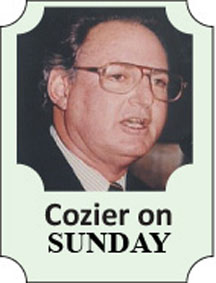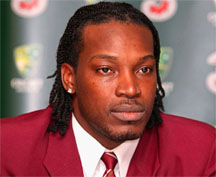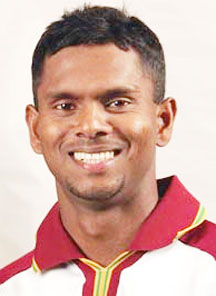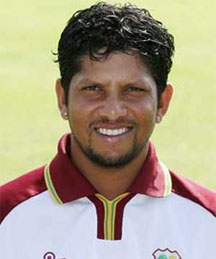As the West Indies top order tottered in both innings of the opening Test at Lord’s, the rider that Ottis Gibson added to his damning censure of the team’s senior batsmen following last year’s World Cup resonated.
The head coach stated then that some young players had emerged in the tournament “on whom we will build our future”, hinting that those who had settled places over the previous decade of decline (he was clearly referring to Chris Gayle, Ramnaresh Sarwan and Shivnarine Chanderpaul) would no longer enjoy automatic selection.

It has not turned out that way.
For one convoluted reason or another, most involving childish personality clashes, Gayle has not appeared for the West Indies since the World Cup, a prolonged controversy that is still not finally settled, in spite of an agreement brokered by a couple of Caricom prime ministers.
While the issue has dragged on, he has enhanced his reputation as the game’s most destructive batsman, plundering sixes by the score for various Twenty20 teams on every point of the cricket compass. Yet even now, in spite of an agreement brokered by a couple of CARICOM prime ministers, it is not certain that he is cleared to return, as he is keen to.
Sarwan has since been confined to just four Tests, the last 10 months ago against India. He had has no lucrative Twenty20 ties but, is convinced, not without reason, that Gibson, Hilaire and influential Guyana members of the WICB have used his fitness as a convenient excuse to keep him out. In the circumstances, he joined English county, Leicestershire, for the current season.
His new team has been fulsome in its praises of his attitude on and off the field and thankful for his heavy-scoring that includes a couple of hundreds and a ninety in his first five matches.

Chanderpaul is the odd man out of the three but only after venting his anger in a fiery letter to Hilaire, demanding an explanation for the chief executive’s blanket criticism of the trio’s discipline and commitment.
While he has been omitted from the shorter formats, Chanderpaul apparently got the answers he needed from Hilaire and resumed his position as the rock of the middle order. How the West Indies would have coped without him in the last four series doesn’t bear thinking about.
So the West Indies went into a Test in England in wintry mid-May, like those in the Caribbean, Bangladesh and India over the past year, with batsmen at Nos.1, 2 and 3 as raw as any in their long history and without the guidance of seasoned men around them.
Adrian Barath, Keiron Powell and Kirk Edwards could count only 24 Tests between them. All were appearing at Lord’s first the time. They were statistics fully exploited by a high quality attack, well versed in the use of the helpful home conditions.
Barath played enterprisingly for his 42 in the first innings but was then undone by an ambitious stroke out of place in the conditions. He got a good one yesterday, a late outswinger from Tim Bresnan.
Kieran Powell was removed by James Anderson’s out-out-in swing combination in the first innings. Yesterday, with tea approaching and Barath just out, the left-hander chose an ill-advised hook against Stuart Broad. The catch to the fielder set specifically deep at square-leg was the predictable outcome.
This was more than just inexperience; it was rank carelessness.
In the first innings, Kirk Edwards aimed to work a straight one to leg and was lbw, inexperience combined with a technical flaw. He could do nothing about yesterday’s dismissal. Darren Bravo was fully culpable.

After the encouraging start to his belated Test career that yielded an overall average of close to 50 from seven Tests, his confidence would have been severely dented entering the second Test at Nottingham next weekend.
The problem confronting the West Indies for the two remaining Tests is that there is no alternative opening batsman among their 15 and no one accustomed to No.3.
A suggested solution, from Brian Lara among others, is for Chanderpaul to move from No.5 to one down.
But he has stated he is comfortable where he is, ready to stem collapses and save lost causes.
Michael Vaughan, the former England captain, put forward another, far more unconventional, on the BBC radio commentary. It was for the team bus to stop through Leicester on its way north to Nottingham for the second Test that starts Friday and pick up Sarwan.
It won’t happen, of course. Even if the West Indies were minded to ask him to return, it is doubtful whether he would for he remains resentful of the way he has been treated by the present dispensation.
In 2010, the WICB, explaining why he had not been offered a contract, was graphically harsh is comments on his fitness. In a public statement, it charged that he had an “extremely indifferent attitude and sporadic approach towards fitness, particularly in recent years”.
This led to “less than satisfactory and fluctuating fitness levels”, citing injuries that restricted him to less than half the West Indies international matches in the preceding contract period (two Tests and 13 ODIs/T20s).
Three months later, he was dropped from the tour of Sri Lanka even after playing in Guyana’s every match in the regional T20 tournament, the Champions League in South Africa and the WICB’s 50-overs tournament.
“Persons with injury problems need to address that,” Gibson said at the time. “We took the decision to address them at the selection of the team, rather than waiting until we reach on tour.”
As I wrote then, the WICB’s new emphasis on fitness and commitment was overdue. It needed to be fair and balanced and, “In Sarwan’s case, it is neither”.
Sarwan was back a few months later for the World Cup where, according to Gayle, Gibson “messed with his mind”. He was unsettled and unhappy. It reflected in his batting that lacked its old flair and assurance. By the end of the subsequent home series, he was dropped.
More recently, he has been caught in the middle of the row between the Guyana Cricket Board (GCB) and the government.

He said here last week that he thought of quitting altogether but his father persuaded him to continue. He is thankful he said for Leicestershire has given him “something that I’ve lost for two years which is happiness and being able to enjoy myself on and off the cricket field.”
In a pointed comment, he said he doesn’t have to worry “about any coaches dropping me or anything like that.”
“I’ve been given a responsibility and I’m enjoying it,” he added.
The responsibility has been as stand-in captain for the injured Matthew Hoggard, as the leading batsman and as the mentor to the younger players.
That is exactly what Gibson spoke about after the World Cup but has seemingly lost sight of. He and the board need to seek reconciliation.
At 31, Sarwan (who, remember, was appointed captain by the board in 2007 following Lara’s exit) is too valuable for a host of reasons to be allowed to drift away from West Indies cricket, especially at a time of rebuilding around a young nucleus of players. Ends.





